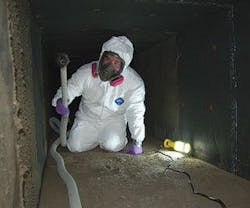Clean HVAC System Coils Save Energy
One of the easiest, most cost-effective green things you can do for your building’s energy efficiency is to have your HVAC system’s condenser and evaporator coils inspected yearly and cleaned as necessary. Dirty coils force compressors to run longer and work harder than required, increasing energy usage and utility costs while decreasing component life and occupant comfort.
According to the U.S. Environmental Protection Agency (EPA), the U.S. Department of Energy (DOE), major utilities, and other experts, dirty condenser and evaporator coils can significantly increase HVAC energy usage and associated utility costs. The U.S. DOE says that “a dirty condenser coil can increase compressor energy consumption by 30 percent.” A dirty evaporator coil decreases airflow, resulting in reduced heat transfer and a degradation of the dehumidification process. These can cause overall air quality to decline and systems to fail, and decrease the life expectancy of motors due to increased heat while running.
Pacific Gas & Electric (PG&E) suggests an annual coil cleaning to its commercial customers as part of its ongoing efforts to promote energy-efficient HVAC-system operations. “Once the system has been properly charged with refrigerant and has good airflow across the indoor coil, and assuming there is no damage to the duct system, only basic service, such as changing filters and cleaning the outdoor unit annually, should be needed to maintain the system operation at peak performance levels,” says PG&E.
With the HVAC system running in “cool” mode, there are two places where heat exchange occurs: 1) condensing unit coils, and 2) evaporator coils. Foreign materials on these coils act as unintended insulators and inhibit the free flow of air through the coils, decreasing the rate of heat transfer between coil and air that is the basis of most HVAC systems. Further, experience shows that servicing dirty systems can lead to misdiagnosing problems and/or faulty or unnecessary repairs. Typically, this results in overcharging of systems and premature failure.
It’s not just old systems that need cleaning. In fact, the newer and more efficient your HVAC system is, the more likely it is to benefit from regular coil inspection and cleaning. These newer systems operate at greatly increased pressures and are less tolerant of increases in static pressure. While clean coils have always been important, today’s higher-efficiency units require more efficient heat transfer across larger coils to function at their highest capacity. New units with high SEER ratings often have variable-speed fan motors that adjust fan speed based on demand; however, these units lose much of their effectiveness when forced to run harder than necessary due to fouled condenser vanes.
An effective coil inspection and cleaning requires more than hosing down the vanes on an exterior compressor coil. The National Air Duct Cleaners Association’s (NADCA) ACR 2006 Standard for HVAC Assessment, Cleaning and Restoration sets minimum best practices for coil cleaning.
| Building Use | Air-Handling Unit | Supply Ductwork | Return Ductwork/Exhaust |
| Industrial | 1 year | 1 year | 1 year |
| Residential | 1 year | 2 years | 2 years |
| Light Commercial | 1 year | 2 years | 2 years |
| Commercial | 1 year | 2 years | 2 years |
| Healthcare | 1 year | 1 year | 1 year |
| Marine | 1 year | 2 years | 2 years |
Robert “Buck” Sheppard is president of the Washington, D.C.-based National Air Duct Cleaners Association.
